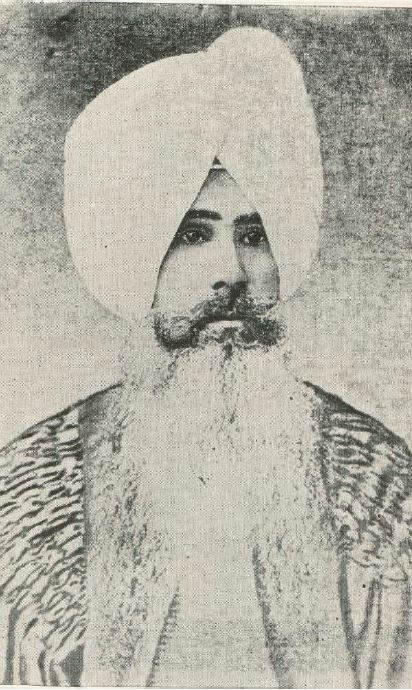DIT SINGH GIANI

Giani Dit Singh (21.4.1853 – 6.9.1906), son of Bhai Diwan Singh, a weaver, was born at village Kalaurh (district Patiala). As a child he was a sharp-witted and intelligent boy. At the age of 10, he was sent to Dera of the Gulabdasi sect, at village Tior (district Ropar). He studied Vedant, prosody, Niti Shastara (diplomacy) and literature of the various schools of eastern philosophy. At the age of 16, he shifted to the main centre of Gulabdasi sect, at village Chhattianwala (district Kasur, Pakistan). He also began studying the Sikhs Scripture and, in a couple of years, he had studied major part of Guru Granth Sahib and the poetry of Bhai Gurdas. Besides, he studied a lot of literature of Punjabi and Urdu languages. At the age of 18 years, he was known as one of the best debaters. By 1875, Giani Dit Singh had become a preacher of Gulabdasi sect. Soon after, he came into contact with Bhai Jawahar Singh Kapur, who himself had been associated with the Gulabdasi sect, for some time. In 1877, Daya Nand, the founder of the Hindu fundamentalist organisation Arya Samaj visited Lahore. Bhai Jawahar Singh Kapur and Giani Dit Singh went to see him. Giani Dit Singh had a debate with Daya Nand. Daya Nand proved no match to the intelligence, wit and clarity of Giani Dit Singh. After this, Bhai Jawahar Singh Kapur and Giani Dit Singh joined the mainstream of the Singh Sabha movement. On April 11, 1880, the first Gurmukhi journal Gurmukhi Akhbar, was launched from Amritsar. Giani Dit Singh and Professor Gurmukh Singh were the main contributors. Their writings enlightened the Sikhs and revived the Sikh national spirit. Giani Dit Singh exposed the hypocrisy of the impostors, who had been posing themselves as the leaders of the Sikh nation. This bold stand could not be tolerated by the Bedis (descendants of Lakhami Das, son of Guru Nanak Sahib) and the other feudal. These feudal created problems for Giani Dit Singh and Professor Gurmukh Singh. This led to division of the Singh Sabha. During this period Sanatani Hindus started work on translation of Guru Granth Sahib in order to distort the Sikh philosophy. Professor Gurmukh Singh protested against it. His bold stand was reacted to by the feudal group. This group received full support from the Sikh feudal. These forces tried to excommunicate Professor Gurmukh Singh from the Sikh Panth. The so-called expulsion order was signed by the yes-men of the anti-Sikh forces. The Sikhs did not bother for this so-called expulsion. This conspiracy was reacted to by Giani Dit Singh and the Sikh elite. Giani Dit Singh was the un-official editor of Khalsa Akhbar, since 1886. In the April 16, 1887 issue of the Khalsa Akhbar, Giani Dit Singh published Supan Natak, a satire exposing the conspiracy against Professor Gurmukh Singh. At this, Sumer Singh Granthi of Patna and Khem Singh Bedi started creating trouble for Giani Dit Singh also. A libel suit was filed by Bawa Udey Singh (a yes-man of Khem Singh Bedi) against Giani Dit Singh. Giani Dit Singh was fined rupees five, by the court (on April 30, 1888, the sessions court reversed the decision of the lower court and acquitted Giani Dit Singh). In the meantime, Kanwar Bikram Singh died, on May 8, 1887. He was the main financial source of the newspaper Khalsa Akhbar. This led to the closure of the paper and the printing press. During those days, the Udasi managers of the Sikh shrines had placed the Hindu idols in the Sikh shrines including Darbar Sahib. Giani Dit Singh led a crusade against this and removed all the idols from the Sikh shrines. On May 1, 1893, Khalsa Akhbar was started again. Giani Dit Singh was appointed the editor. During this period, Giani Dit Singh’s associate Bhai Atar Singh of Bhadaur died in 1895 and Professor Gurmukh Singh breathed his last in 1896. Besides, the economic condition of Giani Dit Singh worsened. In spite of this, he continued his services for the Sikh nation. He helped Bhagat Lakshman Singh launch his paper Khalsa from Lahore on January 5, 1899. Giani Dit Singh had one son (Baldev Singh, born in 1886) and one daughter (Vidyavant Kaur, born in 1890). On June 17, 1901, Vidyavant Kaur died. Giani Dit Singh was very fond of his daughter. An emotional Giani Dit Singh was gravely affected by the death of his beloved daughter. This brought an early death to the great Sikh savant. After serious illness he departed within less than three months of the death of his daughter. Giani Dit Singh gave several valuable works to the Sikh literature, including: Khalsa Dharam Sanskar Vidhi, Nakli Sikh Parbodh, Dambh Vidaran, Mera Te Sadhu Daya Nand DaSanvad, Jiwan Guru Nanak Sahib, Guru Amar Das Sahib, Guru Arjan Sahib, Guru Har Rai Sahib, GuruHarkrishan Sahib, Kalgidhar Upkar, Singhanian De Sidak, Bhai Tara Singh Di Shaheedi, Sikh Bache DiShaheedi, Guru Nanak Parbodh, Panth Sudhar Binai Pattar, Durga Parbodh, Gurmat Aarti Parbodh, Darpok Singh, Raj Parbodh, Sultan Puara, Nawan Nakli Sikh Parbodh, Khalsa Pattar etc. Most of these books are not available now. Giani Dit Singh’s contribution was recognised by the Sikhs (after his death). Bhai Takht Singh established Giani Dit Singh Library at Sikh Kanya Mahan Vidyala (now almost non-existent). Giani Dit Singh Boarding House was also started at Lahore (now non-existent).
(Dr Harjinder Singh Dilgeer)